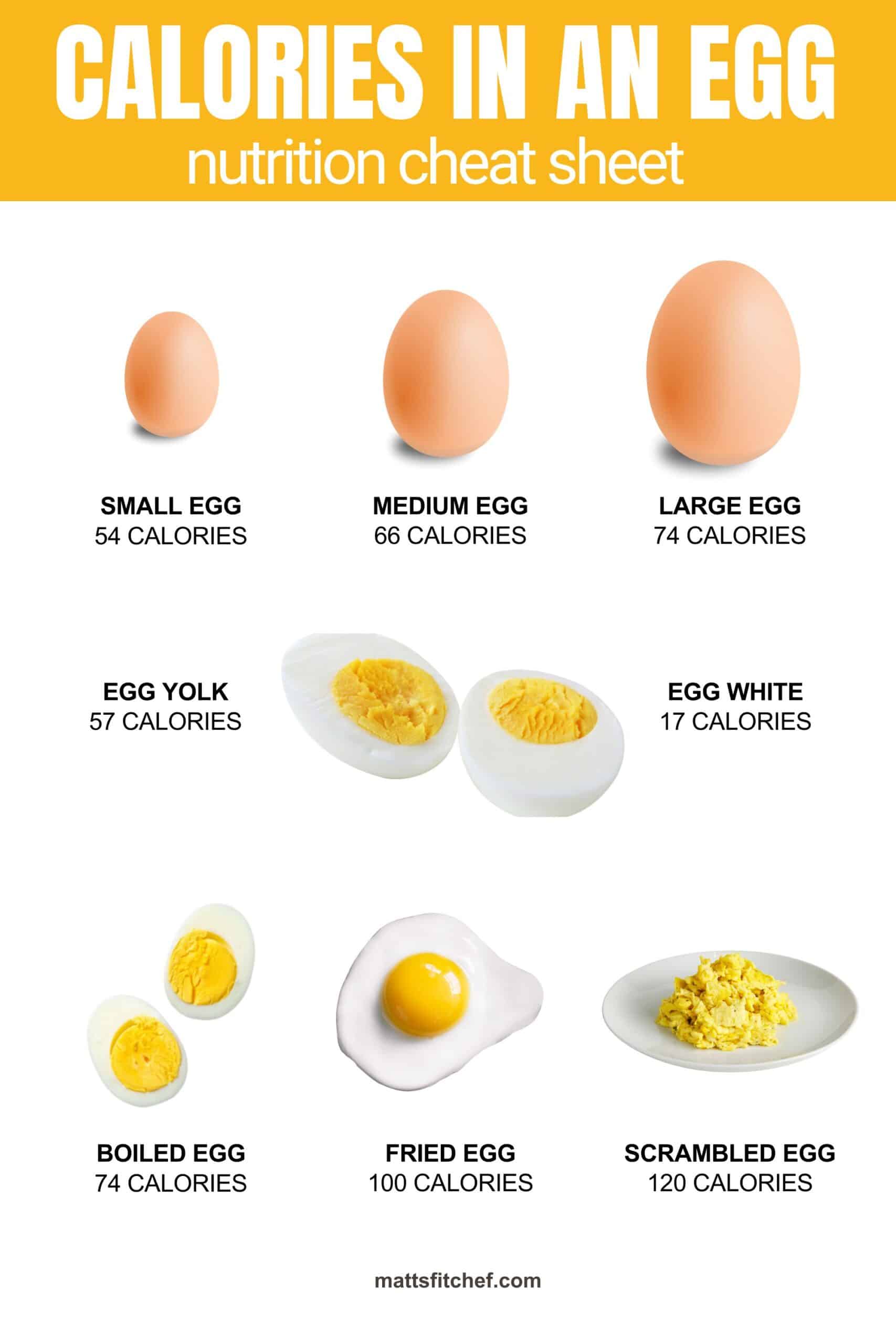Are you curious about how many calories you’re really getting when you eat two eggs? Whether you’re watching your weight, building muscle, or just aiming for a balanced diet, knowing the calorie count of your food is key.
Eggs are a popular choice because they’re packed with protein and nutrients, but the way you prepare them can change their calorie content. You’ll discover exactly how many calories are in two eggs, how cooking methods affect those calories, and why eggs can be a smart addition to your meals.
Keep reading to take control of your nutrition and make smarter food choices every day.
:max_bytes(150000):strip_icc()/egg_annotated2-2cfc8b95948545b8b5efea5feb62e69d.jpg)
Credit: www.verywellfit.com
Calorie Count In Two Eggs
Eggs are a popular food choice for many people. They provide protein, vitamins, and minerals. Knowing the calorie content of two eggs helps with meal planning and diet control. The calorie count varies based on the egg size and parts of the egg used. This section explains the calorie details of two eggs clearly.
Calories By Egg Size
The calorie content changes with the size of the egg. A small egg contains about 54 calories. Medium eggs have around 63 calories each. Large eggs, the most common size, offer about 72 calories each. Extra-large eggs contain roughly 80 calories. Jumbo eggs can have up to 90 calories. For two large eggs, the total is about 144 calories. This number helps people track energy intake accurately.
Calories In Egg Whites Vs Yolks
The egg white and yolk have different calorie amounts. The white is low in calories, with about 17 calories per egg. It is mostly protein and water. The yolk has more calories, about 55 per egg. It contains fats and nutrients. Two egg whites together have about 34 calories. Two yolks add up to around 110 calories. Combining whites and yolks gives the total calorie count for whole eggs.

Credit: www.healu360.com
Impact Of Cooking Methods
The way you cook eggs changes their calorie content. Heat and added ingredients affect the total calories. Cooking also impacts how your body uses the nutrients.
Choosing a cooking method can help control calorie intake from eggs. Some methods add more fat and calories than others. Understanding these differences helps make healthier choices.
Boiled Vs Fried Calories
Boiled eggs keep their natural calories. Two large boiled eggs have about 140 calories. No extra fat or oil is added during boiling.
Frying eggs adds calories because of the cooking fat. Using oil or butter increases the total calories. Two fried eggs can have 180 to 220 calories or more, depending on the fat used.
Effect Of Added Fats
Added fats like butter or oil increase egg calories significantly. One tablespoon of oil adds about 120 calories. Using less oil lowers the calorie count.
Cooking eggs without added fat keeps calories low. Non-stick pans or cooking sprays help reduce extra calories. This way, you enjoy eggs without adding much fat.
Nutritional Benefits
Two eggs provide more than just calories. They offer important nutrients that support health. Understanding these benefits helps you make better food choices.
Eggs are a simple and affordable source of key nutrients. Their nutritional value makes them a popular choice worldwide.
Protein Content
Two large eggs contain about 12 grams of protein. Protein helps build and repair muscles and tissues. It also keeps you full and supports energy levels. Eggs have all nine essential amino acids, making their protein complete. This quality makes eggs a top choice for protein intake.
Vitamins And Minerals
Eggs provide vitamins like B12, D, and A. Vitamin B12 supports brain health and energy. Vitamin D helps maintain strong bones. Vitamin A promotes good vision and skin health. Eggs also contain minerals like iron, zinc, and selenium. Iron supports red blood cells and oxygen transport. Zinc boosts the immune system. Selenium acts as an antioxidant, protecting cells from damage.

Credit: mattsfitchef.com
Raw Eggs And Health Risks
Eating raw eggs carries certain health risks. While raw eggs provide essential nutrients, they may also harbor harmful bacteria. Understanding these risks helps in making safer food choices. Raw eggs can be part of some diets, but safety is crucial.
Salmonella Risk
Raw eggs can contain Salmonella bacteria. This bacteria causes food poisoning. Symptoms include stomach pain, diarrhea, and fever. Salmonella infection can be severe in young children, elderly, and those with weak immune systems. Not all eggs have Salmonella, but the risk is present. Cooking eggs thoroughly kills the bacteria. Eating raw eggs increases the chance of infection.
Food Safety Tips
Buy eggs from trusted sources. Check for cracks or dirt on the shell. Store eggs in the refrigerator at or below 40°F (4°C). Wash hands and surfaces after handling raw eggs. Avoid using raw eggs in recipes that won’t be cooked. Use pasteurized eggs for raw or lightly cooked dishes. Cooking eggs until both yolk and white are firm reduces risk. These steps lower the chance of foodborne illness.
Protein Absorption Differences
Protein absorption from eggs varies significantly based on how they are prepared. The body processes protein differently in raw and cooked eggs. This affects how much protein you actually use from eating two eggs. Understanding these differences helps you get the most nutrition from your meal.
Cooked Vs Raw Protein Bioavailability
Cooking eggs changes the structure of their proteins. Heat breaks down protein bonds, making them easier to digest. Studies show that cooked eggs provide about 90% of their protein to the body. Raw eggs only offer around 50% protein absorption. This means cooked eggs give you nearly twice the usable protein compared to raw eggs.
Raw eggs contain avidin, a protein that binds to biotin, blocking its absorption. Cooking deactivates avidin, which improves nutrient uptake. Eating raw eggs carries a risk of bacteria like Salmonella, which cooking eliminates. For better protein use and safety, cooked eggs are the wiser choice. Two cooked eggs deliver more digestible protein and lower health risks.
Eggs In Weight Management
Eggs play a crucial role in weight management. Their nutrient profile supports a healthy diet. Two eggs provide essential proteins and fats with moderate calories. They help maintain energy levels without excess calorie intake.
Including eggs in meals can promote a balanced approach to controlling body weight. They offer a satisfying option that fits well in calorie-conscious diets. Understanding how eggs affect weight helps in making smarter food choices.
Calories And Weight Gain
Two large eggs contain about 140 calories. This calorie count is moderate and can fit into most diets. Eating eggs in reasonable amounts does not lead to weight gain. The key is balancing calories consumed with calories burned. Eggs provide high-quality protein, which supports muscle maintenance. Muscle tissue helps increase metabolism and burn more calories. Avoid adding high-calorie ingredients like butter or cheese to keep calories low.
Satiety And Appetite Control
Eggs increase feelings of fullness after meals. Their protein content slows digestion and reduces hunger. Eating two eggs can help reduce snacking between meals. Less snacking means fewer extra calories consumed throughout the day. Eggs also help control cravings for unhealthy foods. Including eggs at breakfast supports better appetite control for many hours. This effect can aid weight management by limiting overeating.
Conclusion
Two eggs provide a moderate amount of calories, usually around 140. Cooking method changes calorie count; frying adds more calories than boiling. Eggs offer quality protein, vitamins, and minerals in each serving. They fit well in many diets as a nutritious food choice.
Remember to balance eggs with other healthy foods daily. Simple and affordable, eggs support energy and muscle health effectively.

